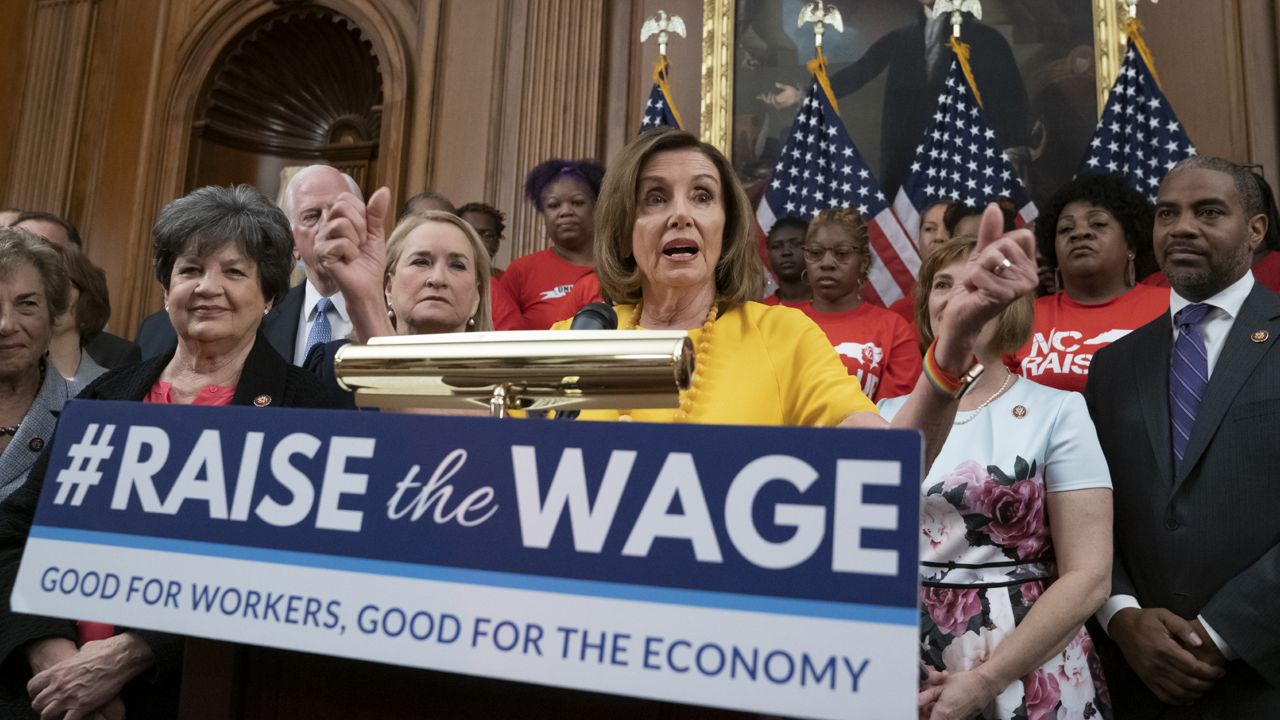A group of Democrats from both the House and the Senate put forward legislation Tuesday that would raise the federal minimum wage to $15 by 2025.
Reps. Bobby Scott (D-VA), Pramila Jayapal (D-WA), and Stephanie Murphy (D-FL) joined Sens. Bernie Sanders (I-VT) and Patty Murray (D-WA) to unveil the Raise the Wage Act of 2021. The plan proposes increasing the federal minimum, which currently stands at $7.25, to $9.50 in 2021. The minimum wage would increase incrementally over the next four years, with a target of a $15 mandated minimum wage by 2025.
Under the proposal, the federal minimum wage would be “indexed to median wage growth” in the years after 2025, meaning the federal minimum would change automatically to account for inflation without action needed by Congress. The legislation also proposes phasing out subminimum wages for tipped workers, youth workers, and workers with disabilities.
“Even before the COVID-19 pandemic, the $7.25 federal minimum wage was economically and morally indefensible,” said Scott, chairman of the House Committee on Education and Labor, in a statement. “Now, the pandemic is highlighting the gross imbalance between the productivity of our nation’s workers and the wages they are paid … The Raise the Wage Act is a critical step toward lifting hardworking people out of poverty, addressing income inequality, and building back a better economy where everyone can succeed.”
Senate Majority Leader Chuck Schumer also voiced his support for the legislation, saying in part: “Americans working 40 hours a week should be able to put food on the table and a roof over their families’ heads.”
“Raising the minimum wage to $15 an hour is one step Congress should take right now, particularly with the COVID-19 crisis stretching families’ resources further than ever,” Schumer continued. “I am happy to move forward with this group to make it happen and give the American people a raise.”
The bill gained wide support from Democrats in both chambers of Congress, with House Majority Leader Steny Hoyer saying the legislation would “increase wages for tens of millions of workers throughout our economy.”
The legislation also supports President Joe Biden’s agenda of increasing the federal minimum wage, a promise he made during his campaign and has touched on in various addresses since taking office. The president also included a $15 federal minimum wage in his $1.9 trillion coronavirus relief proposal.
“As the White House and Democrats in Congress begin our work to build back better, raising wages remains a top priority to ensure that the economy we rebuild will be stronger, fairer, and more replete with opportunities than it was before the pandemic,” Hoyer said.
The bill’s fate is uncertain, as the House previously approved the same legislation last July before sending it to the Senate — where the GOP-controlled body failed to take action on the proposal. Now, with Democrats holding a razor-thin majority in the Senate, the proposal still might not pass: At least ten Republican Senators would need to support the increase in order to break a filibuster.
The federal minimum wage has remained unchanged since 2009, the longest period Congress has gone without adjusting the minimum wage since its creation in 1938.
Statewide minimum wages have increased at varying rates over the past decade. Nearly two dozen states separately voted to raise their minimum wages during the November elections.
In some states, the change will be gradual. For instance, in Florida, the minimum wage will only rise by 9 cents — but it will increase to $10 per hour by September, thanks to a constitutional amendment approved by voters in Nov. that will increase the minimum wage in the state to $15 per hour by 2026.
Still, 20 states will continue to have a minimum wage equal to or below the federal minimum wage of $7.25 per hour as of 2021. Some states, like Alabama and Louisiana, do not have state-mandated minimum wages; others, like Wyoming and Georgia, require employers exempt from the Fair Labor Standards Act pay employees only $5.15 per hour.



